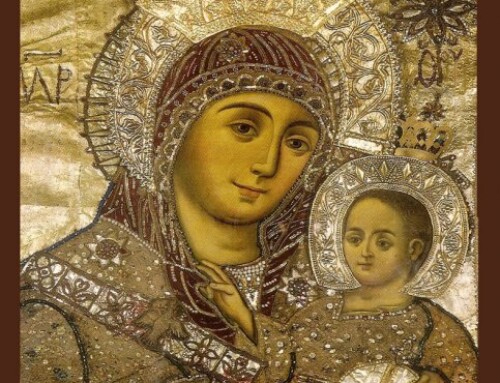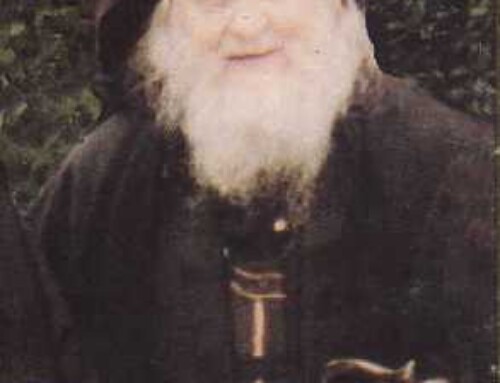Word Magazine April 1978 Page 9-10
THE DEPTHS OF
ST. EPHRAIM’S PRAYER
By Father Joseph Allen
0 Lord and Master of my Life! Remove from me the spirit of slothfulness,faint-heartedness, lust of power and vain talk.
But give to me, thy servant, the spirit of chastity, humility, patience and love.
Yea, 0 Lord and King!
Grant me to see my own transgressions and judge not my brother.
For Thou art blessed unto ages of ages. Amen.
This prayer of repentance is read throughout the entire world-Orthodoxy during Great Lent, itself a time of repentance. It formulates in three thoughts and sentences, the true essence of the Scripture, the teaching and the piety of the Orthodox Faith.
Simply said, in the eyes of the Church, it tells of our desire as dependent children upon God, to have removed from us the wrong things, e.g., laziness, love of power and vain talk; secondly, to give to us the correct things, e.g., humility, patience and love.
The Accuser of the Prayer
Those are easy enough for any Christian to understand. But the third major statement is the “catcher” and the “accuser”: “That I may see my own transgressions and judge not my brother.”
As the Fathers of our Church have always known, these two are connected, that is, first, knowing my own transgressions and then, secondly, judging not my brother.
It is to this third concept of the prayer that our attention must turn. This is true because it is at that point where we, so to speak, must truly do our Christian “work” — knowing ourselves, our own humanity, so that we may not judge. In a certain sense, this requires of us a great struggle and suffering within ourselves, because to truly know oneself is painful — and to thus not judge others, which we are only too ready to do, is painful.
Come with the following thoughts, if you will, that we may attempt to discover exactly what is needed to live after the injunction of that third concept.
First of all, one who is cut off — truncated — from his own depths, from his own humanity, is one who remains cut off from the suffering, the guilt, and the aloneness of his brother. The heart of all Christian behavior begins, not in the dynamics among the people, but within one’s own soul, from which such acts proceed. St. Ephraim’s prayer indicates this truth. But then, it is a truth referred to time and again: “Look down upon me a sinner, thine unprofitable servant. . .“ is the Cherubimic Prayer of the priest. Every “Lord have mercy” in the Liturgy speaks this truth. One can think of St. Peter. It was Peter, being astounded at the shore that the nets are suddenly filled with fish, thus realizing that he was standing before the living God in Christ, who falls to his knees and cries, “Depart from me, O Lord, for I am a sinner.”
It is only after that, that Our Lord says, “Now, I will make you a fisher of men!” One wonders, what does his sinfulness have to do with the nets suddenly being filled? Why should St. Peter say that? The relationship becomes clear when we realize that the act of being a disciple of Christ follows one’s awareness of his own limitedness and sinfulness. The psalmist knew this of old when he sang — and as the priest prays while he censes before the Great Entrance, Psalm 50, “ . . . for in iniquities was I conceived, and in sin did my mother conceive me . . . “
St. Ephraim’s prayer says all that. Our Christian behavior — our act and lives with each other —begins within the humility of one’s own soul.
How to Live It
But still, it does not tell us how to do it. What is, indeed, required to live this prayer? Where is the arena of the “how” in which we struggle with this truth? We ask, who is it that can possibly live it? We ask that, because the prayer means, precisely, that one will suffer, that one will die to his own self, his own need, his own ego. And that indeed is a true spiritual endeavor.
Who will live out the prayer, first of all, is the man of fidelity, of faithfulness, even in the face of such suffering. Brothers and sisters, the prayer implies suffering. The man of fidelity suffers for his choices. He suffers because he has seen and made a decision. He suffers because he is devoted, because he has made a promise. He suffers not only because of what he has done; he suffers, after the manner of Jesus, because of who he is. The man of fidelity who will live out this prayer, is the one who knows that the price will be paid for his words — and his silence! He is a man who is consistent with himself and trustworthy with others — a man who conveys that fidelity as it has been tempered by the pain in his heart. The prayer means that.
The prayer knows that, as fallen humans, we make our friends suffer; sooner or later, as the ancient myths have conveyed the truth symbolically, we put all our lovers to death. This is not because man is all evil, but because he is not yet as innocent as he must be. He is not the Nathaniel to whom Jesus will continually turn throughout the ages and say, “Behold an Israelite in whom there is no guile.”
Seeing
We hurt others more often in our blindness than in our maliciousness. As the prayer says, the tragedy of human nature does not derive only from the fact that we are corrupt, but from the fact that we often fail to see. The man of faith knows and realizes this, i.e., his own failure. Standing before others who will cry, “fool,” for trying to live this prayer, he knows this about himself. And he knows it, even as he is willing to die at the hands of the blind who do not know the same truth. Yet — and this is an important point for the Christian — that man is living in the hope that tomorrow their blindness will be taken from them. As the prayer says, he will not judge now. He will hope for tomorrow.
After all, hoping for tomorrow is the type of patience to which the prayer refers . . . knowing today, but hoping for tomorrow. Who hopes with patience for tomorrow is indeed the prophet in the most spiritual sense. Truly, this prayer calls the one who will be foolish enough to struggle to be such a spiritual prophet. This prophet, the prophet that each of us can be for each other, is not the prophet who “tells fortunes” or phenomenal stories, who dreams of flimsy hopes. The truth is that we have too often heard of “dreams” incorrectly, and the prayer, if we think it is impossible to live, reminds us of both prophets and dreams in which we know the true meaning of that famous word which describes such prophets and dreams: the word to which I now refer is “impossible.”
Impossible to Dream!
I can say that because Jesus dreamed an impossible dream as the prayer means it. This is true because Jesus was not only someone who did good deeds, but someone who dreamed of things which never did come to pass. A prophet is effective if he keeps men dreaming of better alternatives, of hopeful alternatives, of God-like alternatives. Even when a dream fails, a man is better for having dreamt it. A true prophet, then, gives men dreams which are not wild fantasy, but possibilities even though they may never be fulfilled. It is only the prophetic struggling after the dream indicated by this prayer, that we can understand the profound meaning of the words, the “impossible dream.”
To live out this prayer, which seems impossible, is to live with an indication of how life should be lived, both with regard to self and others.
As we asked at the outset, “Who, then, can live this prayer?” It takes the man of fidelity to the Christian life, and the spiritual prophet who will chase after the dream.
But if St. Ephraim’s prayer means all that, it is only because Jesus lived all that. He gave Himself to those who needed Him, rather than to those who had all they needed. He was concerned with a few loaves and fish, with prophesy and Fatherhood, with faith and the lilies. He cared for these realities because they express life’s deepest meanings. Looking at the prayer, we are reminded that Christians are inconsistent when they maintain that the lifestyle of Jesus was suitable for Jesus, but not for us; we claim His doctrine but not His behavior. Yet, it is true that Jesus reveals less in His words than in His life-style and in His death-style. He reveals not only who God is, but what man can become.
That is the how, the “arena,” of St. Ephraim’s prayer of patience, struggle and self-suffering: to become what Christ dreamed man could become.
Father Joseph Allen is pastor of St. Anthony’s in Bergenfield, N.J., and is visiting professor at Holy Cross Greek Orthodox School of Theology. He is CoEditor of The Word.


